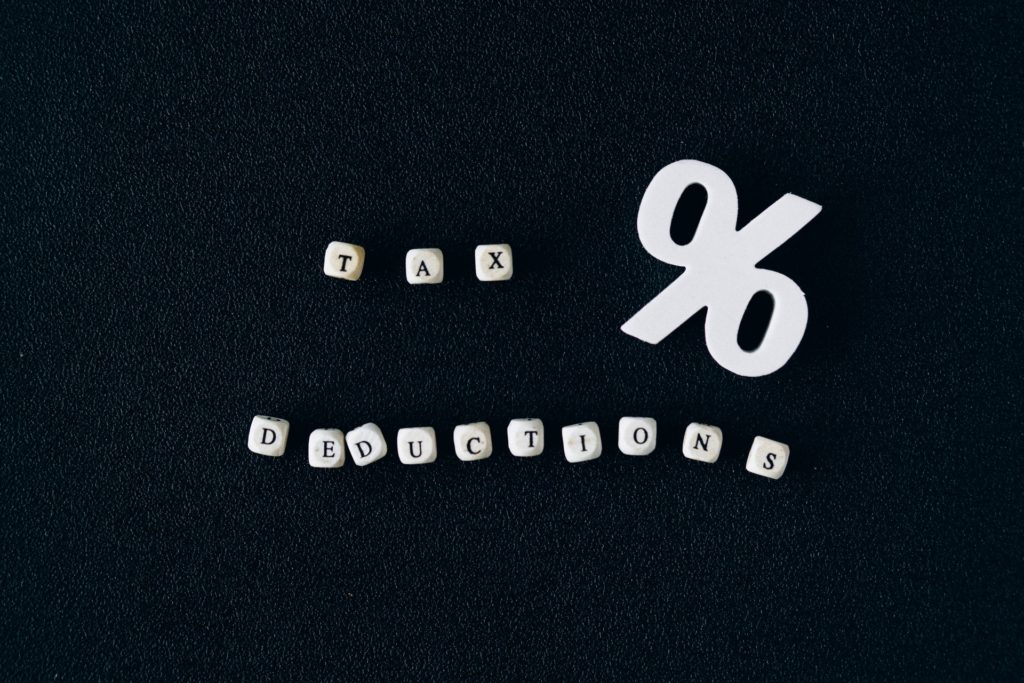50 Small Business Tax Deductions That You Should Know

You don’t need to pay thousands of dollars in taxes when running a small business.
Don’t get us wrong; we are not saying you evade your taxes. We are talking about tax deductions!
There are deductions for almost every business expense, from office supplies to travel costs. We’ve put together a long list from which business owners can benefit.
Ready to learn? Let’s go.
What are small business tax deductions?
Tax deductions are expenses that can be subtracted from your taxable income. This lowers the total amount of taxes you owe.
But to claim them, you’ll need to keep track of all your business expenses throughout the year.
For small business owners, there are two main types of tax deductions:
– Business Expenses: These are the costs incurred in running your business, such as office supplies, travel, and marketing expenses.
– Home Office Expenses: If you work from home, you may be able to deduct a portion of your rent or mortgage, utilities, and other expenses.
Here’s a list of 50+ deductions that can save you money come tax time:
1. Utility
Every business will have utility expenses for electricity, gas, water, or trash. In most cases, you can deduct a portion of your utilities as a business expense.
2. Telephone expenses
You can deduct the entire cost if you have a landline dedicated to your business. The same goes for business-related internet expenses.
Cellphone expenses can also be deducted if you use your mobile phone for business purposes, such as making calls or checking email. You must prove that the portion you subtracted was used for business, not personal calls.
3. Insurance
There are several types of insurance that small businesses can deduct, including:
– Health insurance
– Property and casualty insurance
– Professional liability insurance
– Workers’ compensation insurance
Here you can deduct the entire cost of your premiums. For some, like health insurance, the small business owner can also claim a 50% tax credit.
4. Rent or Mortgage on business property

You can deduct your rent or mortgage as a business expense if you have a physical store. The amount you can deduct depends on how much of your space is used for business purposes.
For example, if you have an 800-square-foot office and use 500 square feet for your business, you can deduct 62.50% of your rent or mortgage as a business expense.
Home office expenses can also be deducted if you work from home.
For example, if you have a 200-square-foot home office and use 100 square feet for your business, you can deduct 50% of your mortgage or rent as a business expense.
Plus, other portions of your utilities, such as electricity and gas, home insurance, and property taxes, are deductibles.
5. Vehicle Expenses
If you use your vehicle for business, you can deduct expenses such as miles, gas and maintenance. The amount you can deduct depends on how much you use your car for business purposes.
That cost can also be included as vehicle expenses for businesses that lease vehicles.
6. Office Supplies and Equipment
Businesses can deduct the cost of office supplies and equipment, such as computers, printers, and furniture. The deduction is typically available for the entire cost of these items in the year they’re purchased.
7. Marketing Expenses
You can deduct a portion of your marketing expenses, such as advertising, public relations, and website development. The amount you can deduct depends on the type of expense.
For example, you can deduct the entire cost of advertising and marketing, considering that it was necessary for generating and keeping customers.
8. Bank charges
Bank charges include monthly service fees for wire transfers and stop payments.
Remember that you can only deduct a portion of these charges related to your business activities.
9. Charitable donations
As a business owner, you can subtract any charitable donations you make as a business expense from cash donations to the value of donated goods and services.
For this deductible to sail through, the company must show proof that a portion of these donations was made by your business.
10. Commissions
Does your business contract work out for independent contractors? If so, you can deduct the commission and fees paid to these contractors as business expenses.
It encompasses any percentage-based commissions, as well as flat fees.
1.1 Depreciation

Depreciation of business assets is a tax deduction that allows you to recover the cost of certain business assets over time.
It compromises things like office equipment, vehicles, and buildings.
The amount you can minus each year depends on the depreciation schedule for the asset.
Read on: How to Keep Books for a Small Business
12. Employee benefits
You can deduct the cost of employee benefits as a business expense. Benefits like health insurance and retirement plans are tax-deductible.
Other expenses to be included are; the cost of fringe benefits, such as employee discounts and transportation reimbursement.
13. Software subscription
Do you subscribe to any software that you use for your business? Keep the receipts close; you can use that to take a few coins off your taxes.
Software falls under miscellaneous itemized deduction and hence can be used to help bring the overall tax down. It needs to be over 2% of the adjusted gross income.
14. Travel expenses
Another small business tax deduction is the cost of travel. This includes airfare, hotels, and rental cars.
Small businesses can also claim the cost of meals and entertainment while on business trips. In order to qualify, it has to be necessary and away from the city or town where you conduct business.
15. Interest expense
Many businesses require loans to fund their operations, and while repayments are expected, companies can find solace in deducting interest rates from their tax deductibles.
However, for this to happen, the business loan must fall under the jurisdictions of the tax laws and must solely be used to cover business expenses.
16. Home office deduction
Small business owners can take advantage of the expenses they incur running a home office. If you have a home office, you can claim business tax deductions for a portion of your home expenses.
Everything from mortgage interest, property taxes, and homeowners insurance can be claimed under home office expenses.
Others include home office supplies, electricity, and cleaning services.
Some of the people who qualify are:
- Independent contractors
- Qualified performing artist
- Fee-basis government officials
- Any worker with impairment-related work expenses
17. Legal and professional fees
Legal and professional fees are tax-deductible business expenses, such as attorney fees, accounting fees, and consultant fees.
Generally, any fee you pay for professional advice or services can help reduce your tax bill.
Read on: How to improve your accounting firm’s efficiency and profit
18. Advertising
Efforts to advertise and promote your business are tax-deductible. This includes the cost of things like online ads, print ads, and sponsorships.
Other costs include designing business logos, buying ads, running social media campaigns, and launching a website.
These are small business tax deductions that can be claimed in their totality. However, other business expenses like lobbying and political party sponsorships are not deductible.
19. Business meals
Any meal while on official company business can be claimed as tax-deductible. A business owner can claim as much as 50% of the total costs of food or beverages.
For a business to claim these tax deductions, the meals ought to be ordinary, nothing fancy or lavish. And an employee or owner must be present during the meal.
Suppose the company works late and orders a meal to the office, which also falls under tax-deductible. They can claim 100% of such business meal expenses.
20. Business education expenses
If you have reasonable business education expenses, you can claim them as a deduction—for example, the cost of things like tuition, books, and course materials.
It also includes the cost of attending business conferences and workshops. However, it must be business related.
For example, if you own a jewelry store, taking a course on gemology would be tax-deductible. But if you took a cooking class, it would not be tax-deductible.
21. Moving expense

Even though the Tax Cuts and Jobs Act eliminated the deduction for moving expenses, there is an exception for military members. You can deduct your moving expenses if a military member moves due to a permanent change of station.
Plus, businesses can still apply for moving expenses deductions if they move their entire operation to a new location.
22. Health insurance premiums
Your health insurance premiums fall under business expenses if you are self-employed and they are deductibles. Think of things like both the cost of your health insurance and the cost of any dependent care.
They can be classified as business expenses if you also pay for long-term care insurance premiums.
23. Office expenses
Many small business tax deductions for office expenses include office supplies, postage, and computer software.
You can deduct the cost of the item in question that is directly related to your business. For example, if you use a computer for personal and business purposes, you can only deduct a portion of the expense related to your business.
24. Employee benefit
Employee benefits include health care, retirement, tuition reimbursement, disability, and bonuses.
25. Retirement plan contributions
If you have a retirement plan for your small business, you can deduct the cost of contributions to the plan. Hence employer and employee contributions, traditional 401(k) plans, and Roth IRA plans can be claimed as deductions.
For example, if you contribute $500 to your employee’s 401k plan, the business can claim this when filing their taxes.
26. Internet Expenses
Does your business rely on the internet? If so, you can deduct the cost of your internet service as a business expense. Both the monthly service cost and any equipment you need to get online can help reduce your taxes.
The tricky part is separating personal from business use. If you use the internet for personal and business purposes, you can only deduct a portion of the expense related to your business.
27. Licenses
Businesses must apply and pay for several different licenses to operate legally. The cost of these licenses is tax-deductible, including business licenses, liquor licenses, and professional licenses. Simply put, any business expense that is required by law is tax-deductible.
28. Child Care expenses
Under the Child and Dependent Care Credit, businesses can knock off a portion of the cost of child care. It incorporates both daycare and after-school programs.
To qualify, the child must be under 13 years old, and the care must be necessary for you to work.
29. Bad Debt

Bad debt is when you lend money to someone, and they don’t pay you back. As a small business, there are two types of bad debts that you can subtract:
–Business bad debts: This was when you lent the money to suppliers, employees, distributors, and creditors, and they failed to repay.
–Consumer bad debts: This was when you lent money or credit sales to an individual, and they didn’t pay you back.
The small business owner needs to prove that the debt is bad and that they have taken reasonable steps to collect it.
30. Employee gifts
Recall those Christmas or end-year gifts you gave to your employees? Well, the cost of those gifts can take a few bucks off your taxes.
However, there are some restrictions. The gift must be given in recognition of achievement, and it cannot be more than $25 per employee per year. Well, at a glance, that does not seem like much, but if you have a few hundred employees, that $25 may make a difference.
31. Taxes
Yes, you read that right. The taxes you pay as a small business owner are tax-deductible, including state and local income taxes, property taxes, and sales taxes. If you paid any of these taxes in the course of doing business, you could deduct them from your taxes.
Some, like the employer’s share of FUTA or FICA, are considered fully deductible.
32. Employee salaries
It encompasses both the salary and any bonuses that are paid out. The only group that does not benefit here are LLC members, partnerships & sole proprietors, as IRS does not consider them employees.
For this to happen, the salaries and wages must be;
- Customary and a necessity
- The amount must be reasonable
- Paid for something that was provided
- Paid in the current fiscal year
33. Business-related entertainment
Businesses are entitled to deduct the cost of entertainment related to the company.
It considers taking clients to lunch or dinner, tickets to a show, and golf outings.
However, there are some restrictions. The entertainment must be directly related to the business and cannot be extravagant.
34. Office furniture
When a business acquires office furniture, the cost can be subtracted from the taxes. They include the costs of desks, chairs, and filing cabinets. The only catch is that the furniture must be used for business purposes and can only be claimed once.
35. Depreciation
Under section 179 deductions, businesses can deduct the cost of specific business-related equipment and property.
It includes vehicles, machinery, office furniture, or depreciation on other assets. The deduction can only be claimed over several years.
36. Inventory
If your business is inventory-based, you can use the inventory cost to lower the taxes.
Consider the cost of raw materials, finished goods, and work-in-progress. The deduction can only be claimed when the inventory is sold. The inventory valuation must be done at the beginning and end of the year.
Deductions could also include the cost of freight, storage, and insurance while the inventory is in your care.
37. Credit card fees
Like bank charges, the fees you pay using a credit card can help bring down the tax bill.
Think of annual, late payment, and foreign transaction fees as a means of taking off dollars from your taxes.
38. Contracted labor
If a business hires an external contractor, the cost incurred can be subtracted from the final taxes owed.
This deductible covers freelancers, contractors, consultants, and hourly wages and salaries. The deductions are considered business expenses and can help reduce your taxes.
But if you pay more than $600 to one contracted labor in a financial year, you must fill out Form 1099-NEC.
39. Repairs and maintenance
When a business does routine maintenance and makes significant repairs, the costs can be claimed as a business expense. Provided the repairs are necessary and directly related to the business.
40. Books
Do you remember that the cost of education is tax-deductible?
Well, the same applies to books. The cost of business-related books can knock off your taxes and includes both physical and e-books.
The deduction is only claimed when the books are purchased.
41. Promotional materials

Promotional materials are tax-deductible and include business cards, flyers, and brochures. The deduction can only be claimed when the materials are used to promote the company or business.
42. Start-up costs
Usually claimed in the first year of business, the cost of starting a small business should be deducted. Costs such as purchasing assets, registrations & licenses, and every expense incurred to get the business running can be included here.
A business can claim up to $5000 used when forming the company into a legal entity.
Read on: 6 Bookkeeping Tips For Small Business Owners
43. Laundry and dry cleaning expenses
Business owners travel a lot, and their laundry and dry cleaning expenses can be deducted. Of course, they have to prove that the laundry and dry cleaning were necessary for the business.
44. Rental cars
Just like having a car is a business expense, renting a car for business can take a few bucks off your taxes.
For this claim to stand, businesses must prove the car is used for business functions.
45. Cleaning and janitorial services
Since cleaning is essential to any business, the cost incurred can be subtracted from the taxes the business pays. These include both the services’ cost and the cleaning materials.
46. Subscriptions
Subscriptions to business-related magazines and journals can be claimed as tax-deductible.
The deduction can only be claimed when the subscription is used for business purposes.
47. Research and development
Some businesses thrive based on research and innovations. This includes experiments, prototypes, and testing that do not come cheap.
To help innovations and creativity thrive, the government allows businesses to subtract the expenses they incur when undertaking research from their taxes. In return, the innovations help drive economies forward.
48. Real estate losses
People working in real estate, i.e., working at least 751 hours per year in real estate, can minus their losses from their taxes.
Real estate losses occur when the expenses of a rental property are more than the rental income.
49. Sick and Vacation Pay
Businesses can claim the cost of sickness and vacation pay is tax-deductible. To qualify, the amount must not be covered by the insurance cover.
Deductible amounts include money paid for sickness or injury, wages, and lump-sum amounts.
50. Reimbursements for Business Expenses
When employees make payments on behalf of the company and claim the money back, it is called a reimbursement.
The cost of the reimbursement can help reduce tax bills but with limitations. If the reimbursement falls under an accountable item, it should be deducted from that category. For instance, the claim should fall under office supplies if the employee bought office supplies.
Other small business tax deductibles include:
- Expenses paid to obtain a mortgage
- Welfare benefit funds
- Amortization
- Collection expenses
- Plus many more
What you need to know before claiming tax deductibles

Taxes are paid after expenses are deducted from the total income. That’s what is known as the tax base.
Here are a few things you need to know about claiming tax deductibles;
– They must be necessary & Ordinary
An expense must be necessary and ordinary to be considered a deductible. A necessary expense is helpful and appropriate for your business. An ordinary expense is common and accepted in your industry.
– You must have receipts
You must have supporting documentation to claim a deduction, such as receipts, invoices, canceled checks, or bank statements. This documentation should be kept safe in case the IRS questions your deductions.
Try digital storage programs if you struggle with keeping receipts and other documents. Envoice, Dropbox, or Google Drive can make it easy to keep track.
– You can’t deduct personal expenses
Personal expenses are not tax-deductible. This includes things like haircuts, dry cleaning, and entertainment. You can only deduct a personal expense to prove it was necessary for business purposes.
– The expenses must be paid or incurred
To claim a deduction, you must have paid or incurred the expense. You can’t deduct an expense if you only owe the money. The transaction must have happened, and the money must have changed hands.
– You can’t deduct fines or penalties
Fines and penalties imposed by the government are not tax-deductible. This includes things like parking tickets, speeding tickets, and environmental fines. Even if the fines are penalties are related to your business, you can’t deduct them.
– Ask for professional help
If you’re unsure whether an expense is tax-deductible, it’s always best to ask for professional help. A tax advisor or accountant can help you determine which expenses are deductible and which ones are not. They can also help you keep track of your deductions and ensure you don’t miss any deadlines.
Now that you know about small business tax deductions, it’s time to get organized and start claiming them! A little organization will save you a lot of money (and headaches) come tax time.
If you’re looking for further ways to minimize expenses, consider automating time-consuming manual tasks like data entry. Contact Envoice to book a free consultation and discuss how we can help you today.
STAY ALWAYS TUNED
Subscribe to newsletter
Still not sure?
- Don’t spend time on manual work
- Streamline bookkeeping processes with AI
- Automate invoice processing
- Integrate with the tools you rely on every day












